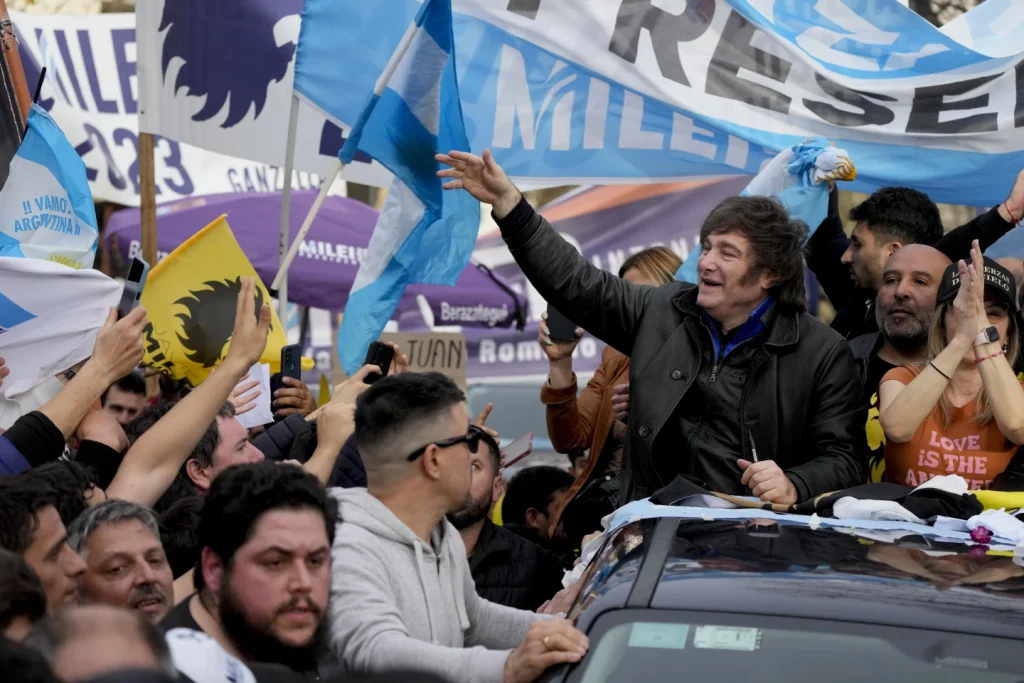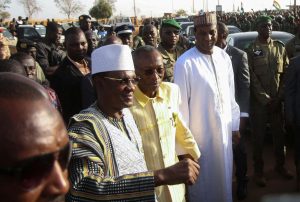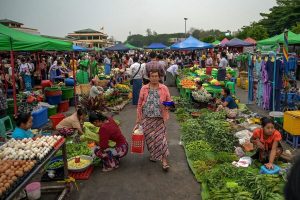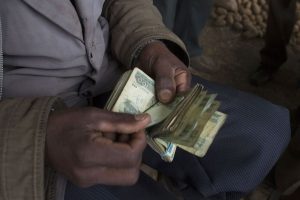Opinion: Argentina highlights Latin America’s struggle for progress
Javier Milei’s libertarian revolution for Argentina is the old populism with a different look, writes José Martinez Sanguinetti, who manages a $3.5 billion global portfolio as chief investment officer at Rimac Seguros.

Javier Milei at a campaign event on September 12. Photo: Natasha Pisarenko/AP
Latin America is blessed with rich soil, plentiful natural resources and a relatively young population. The region extending from Mexico to Argentina is effectively the third largest economy in the world if GDP were measured at purchasing power parity.
Despite this, this sleeping giant remains trapped in mediocrity, unable to reign over its own future.
Argentina is a good, if extreme, case in point for the whole region. Its GDP per capita is sufficient for it to be considered a higher income country. It is the eighth largest country in the world. It ranks amongst the largest producers in the world of many agricultural products and meat. It is the fourth largest producer of lithium. It has a broad industrial base that supplies a 45 million-person domestic market. Most Argentines are ethnically European and highly literate.
Notwithstanding this, Argentina’s inflation rate will likely reach levels over 140% this year while GDP contracts about 3.5% as an El Niño-related drought adds to pressure from uncontrolled fiscal spending and broken finances to sink this country into an ever more severe crisis. In the meantime, the official exchange rate for the Argentine peso versus the US dollar is reaching new highs at 350 per dollar while the market rate remains twice as high at around 700 peso per dollar.
Argentina is a country of many blessings and a curse: Its democracy is highly fragmented and polarized. Consensuses need to be reached in several instances at different levels in the executive, the judiciary and both congressional chambers for any initiative to progress. However, its highly dogmatic and ideological political system remains dysfunctional, divided and confrontational as well as insensitive to the collapse of the country’s economy.
Most Argentines would like to see their democracy radically transformed. Argentina needs consistent representation of the people in government, consensuses and a lot less corruption. None of the traditional parties has, so far, been able to deliver them.
This situation is fertile ground for outsiders and Javier Milei, a seemingly orthodox economist and Libertarian, is using it to his advantage. He is the first runner up for this October’s presidential election and has gotten there running on an incendiary discourse that promises to change Argentina’s political system and the administration of the economy from their roots. His promises include less taxation, less government spending, complete elimination of the central bank, adoption of the US dollar as legal tender and a tough hand on crime amongst many other things. His freshness vis a vis the ruling “casta” of politicians has earned him great popularity.
Eye-catching but unnecessary
Unfortunately, most of his campaign promises are—though thunderous—impossible to implement within Argentina’s democracy, and many are simply unnecessary. For instance, substituting the peso for the US dollar will not reduce inflation in the long term unless the fiscal deficit is reined in. However, if the latter were accomplished, dollarization would become unnecessary, costly and highly inconvenient for a country where wages remain well below those in the US.
If dollarized, due to its high foreign indebtedness and inflexible labor markets, Argentina would not take long to develop a crisis similar in nature to that suffered by Greece after it adopted the euro—but much more severe.
In this sense, unless Milei substantially changes his strategy if and when wins, he is unlikely to accomplish much. In the meantime, financial conditions for most Argentines will continue to deteriorate. Milei risks becoming a reloaded version of the old Latin American Populista, but one who speaks the words of an Austrian economist rather than the usual socialistic rhetoric.
Most Latin American countries are likely to hold elections between 2023 and 2026. Currently, nearly all countries in the region are run by leftist governments that have mostly failed to engineer substantial change. Despite their relative success in reducing inflation, the region’s economies lag behind other emerging economies in the race for digitalization and nearshoring because of low growth and a weaker long-term competitive position with regard to key factors such as infrastructure, rule of law, education and innovation.
Research for this article was conducted by Lorenzo Martinez Roveda






